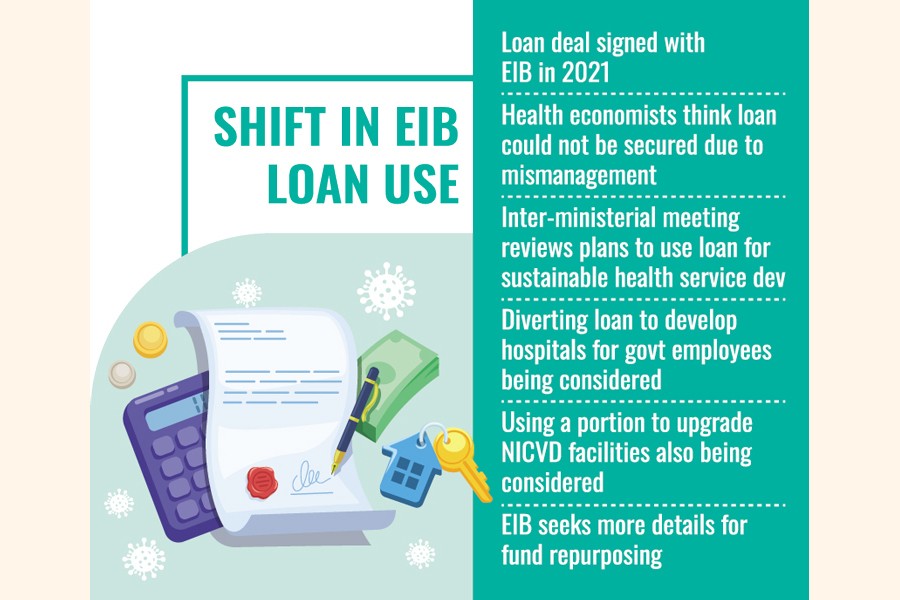
Published :
Updated :

Despite signing a €250 million loan agreement with the European Investment Bank (EIB) in 2021 to procure Covid-19 vaccines, the health ministry has not received a single penny yet.
Nearly four years later, the government is now considering repurposing the fund to develop hospitals for government employees under the Ministry of Public Administration.
To advance the plan, the Economic Relations Division (ERD) held an inter-ministerial meeting last week, with a follow-up scheduled for next week, according to ERD officials.
"In addition to expanding hospitals for government employees to the divisional level, a portion of the loan is also being considered for upgrading facilities at the National Institute of Cardiovascular Diseases (NICVD)," said Dr Mohammad Mizanur Rahman, additional secretary and chief of the Europe Wing at the ERD.
However, health economists have attributed the failure to secure the loan to mismanagement and also suspected intentions of corruption.
They noted that disbursing the foreign currency would have eased pressure on the country's forex reserves and helped stabilise the exchange rate.
Besides, they argued that investing in infrastructure for government employee hospitals is a lower strategic priority compared to vaccine procurement, especially in the context of addressing an emergency health crisis and safeguarding public health.
Sources said an inter-ministerial meeting on the utilisation of funds under the Bangladesh Covid-19 Public Health Programme for the Development of Sustainable Health Services was held on May 17 and chaired by ERD Secretary Shahriar Kader Siddiky.
According to the minutes, Shahriar told the meeting the agreement was signed with the EIB on December 29, 2021 to procure Covid-19 vaccines, strengthen the healthcare system, and expand social protection in the health sector, but the loan had not been disbursed yet.
When the Health Services Division indicated there was no need to purchase new Covid-19 vaccines, both parties agreed to reallocate the fund to support the ongoing expanded programme on immunisation (EPI) activities through bilateral budget support as per the financing agreement with the EIB, he added.
Officials said the Health Services Division proposed an alternative use of the loan as the agreement expired in December last year.
The agreement allows funds to be used for mid-term pandemic preparedness beyond vaccine procurement, claimed officials of the health ministry.
"Specifically, the funds can be used to enhance pandemic preparedness, strengthen the country's health system capacity, and improve resilience through dedicated equipment and related infrastructure," said a letter from the health ministry.
The meeting reviewed plans to use funds for sustainable health service development, focusing on expanding government employee hospitals and enhancing NICVD's capacity for advanced treatment, as per the minutes.
Dr Roksana Tarannum, joint secretary of ERD, said the EIB had asked for inputs on using funds for NICVD and government employee hospitals.
The EIB said the proposal might fit within the project scope but it needed more details from the ERD and the health ministry to confirm eligibility.
In this regard, the meeting requested detailed information, including project plan and procurement plan for government employee hospitals, from the public administration ministry, as well as confirmation that medical services would be accessible to the general public.
Dr Syed Abdul Hamid, professor at the Institute of Health Economics under Dhaka University, said early disbursement of the fund would have helped ease the pressure on foreign currency reserves and exchange rate, as well as provided better service for people in the pandemic period.
However, he emphasised that loans should be used for infrastructure that benefits the general public, not just a specific group.
The NICVD provides treatment for the mass people and its expansion should be prioritised, he added.
jahid.rn@gmail.com


 For all latest news, follow The Financial Express Google News channel.
For all latest news, follow The Financial Express Google News channel.